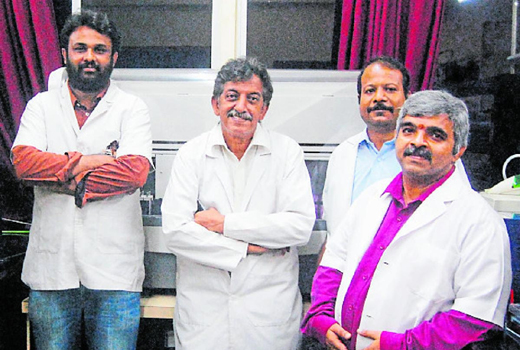Manipal researchers discoverer insulin effects on blood vessels
Manipal researchers discoverer insulin effects on blood vessels
Mangalore Today News Network
Manipal, Aug 09, 2018: Scientists at School of Life Sciences (SOLS), Manipal Academy of Higher Education (MAHE), have identified genes influenced by inflammatory mediator, interleukin-6, on endothelial cells associated with insulin resistance, Dr K Satyamoorthy, director, SOLS, has said.

Dr Satyamoorthy, who is also the leader of the team, said that the key genes could be the reason why Type 2 Diabetic (T2D) patients suffer from vascular diseases in spite of controlling the glucose levels by insulin or anti-diabetic drugs.
The extensive research was published in the scientific journal, ‘Laboratory Investigations’, a springer-nature journal.
Dr Satyamoorthy said that the hypothesis behind morbidity associated with vascular diseases in T2D, even after strict control of glucose levels, is due to metabolic memory. “This is based on epigenetic mechanisms and can be regulated by factors such as inflammation, hyperglycemia, or stress. Studying these epigenetic mechanisms was therefore important and led to the discovery of new genes and mechanisms,” he said.
Normal levels of IL-6 produced by immune cells protect the body from pathogens during infections. However, conditions such as diabetes are associated with sterile inflammation. Increased production of IL-6 levels leads to deleterious effects and may even cause insulin resistance, he explained.
Dr Manjunath B Joshi, primary scientist added, “It has long been known that the inflammatory molecule IL-6 concentrations are high in the serum of T2D patients. We had been studying the IL-6 influences endothelial cells and the possible role in disturbing insulin function. Our work links high IL-6 levels with decreased insulin function and investigates underlying epigenetic mechanisms”.
Key enzyme : Ashwath Balakrishnan, a PhD scholar associated with the work at MAHE, said, “Epigenetic changes caused by key enzyme, DNMT1 is destabilised in response to IL-6. This leads to disturbed production of nitric oxide and hence insulin is unable to impart its normal function.”
Dr Vinod Bhat, Vice Chancellor of MAHE, said, “MAHE is supporting molecular genetics programme as there is plenty to discover to the benefit of patients. Majority of the T2D subjects suffer from vascular diseases and it is important to study vascular endothelial cells to identify newer therapeutic interventions to restore normal function of the endothelial cells.”
General benefit : Dr H S Ballal, Pro Chancellor for MAHE, said, “We have been striving for societal benefit through our network of hospitals, education institutions with special emphasis on research and developmental activities. The work being carried out at the SOLS is critical to manage chronic diseases and may lead to better clinical practices.”
- 30-year-old woman found stabbed to death in Kerala
- Mallikarjun Kharge unveils Mahatma Gandhi statue in Belagavi
- 12 Naxalites killed in encounter with security forces in Chhattisgarh’s Gariaband
- Bengal challenges life term for RG Kar convict, demands death penalty in High Court
- Usha becomes first Indian-American Second Lady as JD Vance takes oath as US Vice President
- BJP to hold 3 meetings on January 21 amid infighting
- Bengaluru woman, going to her brother’s house, raped by 2 men who gave her lift
- Trump returns to White House, signs orders to pardon rioters, exit paris pact
- Delhi polls: AAP launches blank book on BJP’s ’achievements’ ahead of polls
- Soldier killed in encounter with terrorists in J&K’s Sopore
- Pregnant cow slaughtered in Karnataka; Siddaramaiah govt ’taking matter seriously’
- RG Kar case convict gets life term, judge says case not rarest of rare
- Mangaluru Press Club Honorary Award announced
- Justice KS Hegde hospital launches state-of-the-art Robotic Surgery
- Manipal: West Bengal origin man jumps to death from 4th floor
- Udupi: Man arrested for operating sex trade racket; woman rescued
- Drugs peddling case: Court sentences man to two and a half years RI
- Mangaluru: Tulu Film Producers’ Association submit memorandum to CM
- Karkala: MBA student ends life, jumping into a well
- MRPL flags off its first Toluene parcel
- Students oppose fee for corrections in II PUC marks card
- Online investment fraud: Mangaluru and Udupi residents lose over ₹27 lakh
- Mangaluru Police crack Kotekar Cooperative Society’s robbery case, arrest three
- MCC spending Rs 1.5 crore on each STP, still sewage water flowing in gutters: Ivan D’Souza
- Uchila: Hundreds block NH 66 to protest against serial accidents
- Sandhya Shenoy honored with Society for Materials Chemistry Medal-2024
- White Cornus Apartment in Mangaluru
- City girl wins first place in state-level spell bee competition
- Alleged ‘Love Jihad’ Case in Mangaluru: Woman left home voluntarily, says police
- Girl fatally struck by reckless two-wheeler near Belman
- New residential complex for the judges inaugurated in Mangaluru
- Absconding accused nabbed after 8 years
- Truck with cylinders turns turtle in Beltangady
- Bhoota Kola artist dies of cardiac arrest
- Development of the country should be our goal: Ganesh Karnik
- Container truck gets stuck under Modankap railway bridge
- Truck crushes bike’s pillion rider near BC Road
- Head constable dies of heart attack
- Udupi: PDO dismissed over financial irregularities
- CREDAI to resume Skill Development Program for Construction Workers in Mangaluru
- CITY INFORMATION
- TRAVEL
- TOURIST INFORMATION
- HEALTH CARE
- MISCELLANEOUS




 Write Comment
Write Comment E-Mail
E-Mail Facebook
Facebook Twitter
Twitter  Print
Print 



